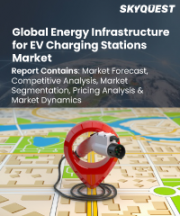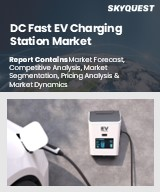
|
시장보고서
상품코드
1817995
전기자동차 충전소 장비 시장 예측(-2032년) : 충전소 유형별, 출력별, 컴포넌트별, 설치 유형별, 공급자 유형별, 커넥터 유형별, 최종 사용자별, 지역별 분석Electric Vehicle Charging Stations Equipment Market Forecasts to 2032 - Global Analysis By Charging Station Type, Power Output, Component, Installation Type, Supplier Type, Connector Type, End User and By Geography |
||||||
Stratistics MRC에 따르면 세계 전기자동차 충전소 장비 시장은 2025년 3,421억 7,000만 달러를 차지하고, 예측 기간 동안 CAGR은 32.1%로 성장하여 2032년까지 2조 4,019억 1,000만 달러에 이를 것으로 예측됩니다.
전기자동차 충전소 장비 시장은 지속 가능한 이동성으로의 전환을 지원하는 것으로 빠르게 확대되고 있습니다. 이 시스템은 전기자동차의 원활한 충전을 보장하도록 설계된 충전 플러그, 전원 모듈, 소프트웨어 플랫폼, 제어 장치 등의 주요 요소로 구성됩니다. 지원 규제와 녹색 이니셔티브에 힘입어 EV 판매 증가는 고급 충전 장치에 대한 수요를 증가시키고 있습니다. 이 솔루션에는 빠른 충전, 실시간 모니터링, 스마트 에너지 관리 등의 지능형 기능이 내장되어 있어 효율성과 편의성을 모두 제공합니다.
국제에너지기구(IEA)에 따르면 EV 보급률의 상승과 정부의 지원 정책에 의한 급속한 인프라 확대를 반영하여 2023년에는 세계 공공 EV 충전기의 수가 40% 이상 증가했습니다.
전기자동차 보급 확대
전기자동차 보급 확대는 전기자동차 충전소 장비 시장의 기본적인 성장 촉진 요인입니다. 환경문제에 대한 우려, 정책적 인센티브, 배출규제의 엄격화 등에 힘입어 소비자의 EV에 대한 선호도는 눈부신 페이스로 상승하고 있습니다. 이 성장은 접근성과 효율성을 보장하는 신뢰할 수 있는 충전 장비에 대한 수요를 자극합니다. 자동차 제조업체는 다양한 EV 모델을 투입하고 있으며, 정부기관과 민간기업 모두 충전 네트워크 확대에 적극 투자하고 있습니다. EV 소유자 증가는 급속 충전기 및 지능형 에너지 관리 시스템과 같은 고급 충전 기술에 기회를 제공합니다.
높은 설치 비용과 유지 보수 비용
전기자동차 충전소 장비 시장에 영향을 미치는 주요 제약 중 하나는 설치 및 유지에 많은 비용이 듭니다. 첨단 충전소, 특히 급속 충전 장치를 설치하려면 기술, 전력 인프라, 토지 개발에 많은 투자가 필요합니다. 게다가 정기적인 유지보수의 필요성과 운영상의 어려움은 경비를 증가시켜 프로젝트를 재정적으로 엄격하게 만듭니다. EV의 확산이 아직 시작된 시장에서 투자자의 수익성은 여전히 불투명하고 지연이 발생하고 있습니다. 이는 예산이 제한된 개발도상국들에게 특히 도전입니다. 그 결과, 고액의 자본 지출과 긴 투자 회수 기간에 의해 충전 네트워크의 대규모 전개가 제한되어 시장 전체의 성장이 대폭 둔화됩니다.
신재생에너지와 스마트그리드의 통합
신재생에너지원과 EV 충전소의 연계는 전기자동차 충전소 장비 시장에 큰 기회를 가져왔습니다. 태양광, 풍력 및 하이브리드 시스템을 통한 솔루션은 기존 전력망에 대한 의존성을 줄이고 지속가능성을 향상시킵니다. 스마트 그리드 기술을 도입하면 보다 나은 부하 관리, 수요 균형, 효율적인 에너지 활용이 가능하며 안정적인 운영이 보장됩니다. 이러한 환경 친화적인 충전 시스템은 비용을 절감하고 환경 의식이 높은 고객에게 호소하며 세계 배출 감소 목표를 준수합니다. 관민 이해관계자는 신재생에너지 충전 프로젝트에 많은 투자를 하고 있습니다. 청정 에너지와 스마트 인프라의 융합은 혁신적인 장비 개발과 장기적인 시장 성장의 길을 열어줍니다.
사이버 보안 및 데이터 프라이버시 위험
충전 설비의 디지털화가 진행됨에 따라 사이버 보안과 프라이버시에 대한 우려가 전기자동차 충전소 설비 시장에 큰 위협이 되고 있습니다. 첨단 시스템은 과금, 모니터링, 제어 기능에 IoT, 클라우드 서비스, 모바일 애플리케이션을 활용하고 있습니다. 이러한 연결성은 효율성을 향상시키지만 충전소을 해킹, 무단 액세스 및 데이터 도난의 위험에 노출시킵니다. 정보 유출은 업무를 혼동시키고 고객 정보를 유출하며 EV 인프라에 대한 신뢰를 해칠 수 있습니다. 보안 문제가 발생하면 서비스 제공업체에 대한 재무적 영향이 상당할 수 있습니다. 견고한 보호를 보장하려면 빈번한 업데이트, 안전한 통신 프로토콜 및 적극적인 모니터링이 필요합니다. 이러한 위험을 다루지 않으면 보급이 방해되고 성장이 제한될 수 있습니다.
COVID-19의 영향:
전기자동차 충전소 장비 시장은 COVID-19 위기의 영향을 크게 받았으며, 세계 공급망의 중단, 잠금 및 이동 제한으로 인프라 프로젝트가 지연되었습니다. 경제 불안과 소비자의 구매력 감소도 EV 판매를 둔화시켜 충전 설비 수요에 직접적인 영향을 미쳤습니다. 제조업체는 부품 부족, 비용 상승 및 물류 병목 현상과 같은 문제에 직면했습니다. 이러한 좌절에도 불구하고, 유행은 지속가능성에 대한 의식을 높이고, 각국 정부가 녹색 부흥 프로그램을 우선으로 EV 인프라에 투자하도록 촉구했습니다. 경제가 재개됨에 따라 이 분야는 정책적 인센티브와 가전에 대한 관심 증가에 힘입어 기세를 되찾기 시작했으며, 그 결과 충전소의 신속한 배치 기회가 탄생했습니다.
예측 기간 동안 하드웨어 부문이 최대가 될 것으로 예상
하드웨어 부문은 충전 인프라의 기반이기 때문에 예측 기간 동안 최대 시장 점유율을 차지할 것으로 예측됩니다. 충전기, 플러그, 케이블, 전원 모듈, 차량 충전을 직접 가능하게 하는 계측 시스템 등의 중요한 요소가 포함됩니다. 이러한 구체적인 구성 요소는 상업, 주택, 고속도로 등의 장소에 충전소를 설치하는 데 필요합니다. 현재 진행 중인 기술 혁신, 특히 빠르고 효율적인 충전 솔루션은 첨단 하드웨어의 필요성을 더욱 향상시키고 있습니다. 강력한 물리적 인프라가 없으면 충전 시설을 운영할 수 없기 때문에 하드웨어는 계속 시장을 선도하고 세계 EV 사용자에게 효과적인 전력 공급, 운영 신뢰성, 안전성을 보장합니다.
예측 기간 동안 CAGR이 가장 높을 것으로 예상되는 휴대용 충전 유닛 분야
예측 기간 동안 휴대용 충전 유닛 분야가 가장 높은 성장률을 보일 것으로 예측됩니다. 휴대용 충전 장치의 인기는 이동성 향상, 사용자 편의성, 어디서나 충전 지원을 제공할 수 있기 때문입니다. 거치형과 달리 휴대용 충전기는 EV 소유자에게 유연한 충전 옵션을 제공하여 가정에서 사용, 여행, 긴급 요구에 적합합니다. 가벼운 구조와 간단한 조작은 특히 공공 충전 네트워크가 개발되지 않은 지역에서 널리 채택되었습니다. 전기자동차의 보급이 진행됨에 따라 범용성이 높은 충전 솔루션에 대한 요구가 급증하고 있으며, 휴대용 충전 유닛은 가장 급성장하는 시장 부문이 되었습니다.
최대 점유율을 차지하는 지역:
예측 기간 동안 아시아태평양이 가장 큰 시장 점유율을 차지할 것으로 예측됩니다. 이것은 지원 규제, 급속한 산업 성장, EV 도입의 급증이 배경에 있습니다. 중국, 일본, 한국 등의 국가들은 충전 인프라, 특히 급속 충전 솔루션과 신재생에너지 통합에 대한 대규모 투자로 주도하고 있습니다. 이 지역은 톱 클래스의 EV 제조업체나 부품 공급자가 존재해, 현지에서의 생산 및 전개 능력을 높이고 있습니다. 정부와 민간 기업의 강력한 협력 관계를 통해 광범위한 인프라 확장이 가능합니다. 낮은 배출가스 실현과 깨끗한 운송 추진에 주력하는 아시아태평양은 세계 시장에서 압도적인 힘을 유지하고 있습니다.
CAGR이 가장 높은 지역:
예측 기간 동안 북미가 가장 높은 CAGR을 나타낼 것으로 예측됩니다. 이것은 급속한 EV의 보급, 유리한 규제, 관민 쌍방으로부터의 투자 증가에 지지되고 있습니다. 미국과 캐나다는 인센티브, 보조금 및 인프라의 의무화를 통해 깨끗한 이동성을 적극적으로 추진하고 있습니다. 자동차 제조업체, 기술 기업 및 에너지 공급자 간의 전략적 파트너십은 도시, 고속도로, 주거 지역에서의 급속 충전 시스템 및 스마트 충전 시스템의 전개를 강화하고 있습니다. 친환경 교통수단에 대한 소비자의 관심이 높아지고 연결되고 효율적인 충전장치의 기술진보가 함께 북미가 가장 성장률이 높은 지역이 되고 있습니다.
무료 주문을 받아서 만드는 서비스:
이 보고서를 구독하는 고객은 다음 무료 맞춤설정 옵션 중 하나를 사용할 수 있습니다.
- 기업 프로파일
- 추가 시장 기업의 종합적 프로파일링(3개사까지)
- 주요 기업의 SWOT 분석(3개사까지)
- 지역 세분화
- 고객의 관심에 응한 주요국 시장 추계, 예측 및 CAGR(주: 타당성 확인에 따름)
- 경쟁 벤치마킹
- 제품 포트폴리오, 지리적 존재, 전략적 제휴에 기반한 주요 기업 벤치마킹
목차
제1장 주요 요약
제2장 서문
- 개요
- 이해관계자
- 조사 범위
- 조사 방법
- 데이터 마이닝
- 데이터 분석
- 데이터 검증
- 조사 접근
- 조사 자료
- 1차 조사 자료
- 2차 조사 정보원
- 전제조건
제3장 시장 동향 분석
- 성장 촉진요인
- 억제요인
- 기회
- 위협
- 최종 사용자 분석
- 신흥 시장
- COVID-19의 영향
제4장 Porter's Five Forces 분석
- 공급기업의 협상력
- 구매자의 협상력
- 대체품의 위협
- 신규 참가업체의 위협
- 경쟁 기업간 경쟁 관계
제5장 세계의 전기자동차 충전소 장비 시장 : 충전소 유형별
- 공공 충전소
- 개인 및 자택 충전소
제6장 세계의 전기자동차 충전소 장비 시장 : 출력별
- 레벨 1(최대 7.2kW)
- 레벨 2(7.2-22kW)
- 레벨 3/DC 급속 충전(22kW 이상)
제7장 세계의 전기자동차 충전소 장비 시장 : 컴포넌트별
- 하드웨어
- 소프트웨어
제8장 세계의 전기자동차 충전소 장비 시장 : 설치 유형별
- 고정 설치
- 휴대용 충전 유닛
제9장 세계의 전기자동차 충전소 장비 시장 : 공급자 유형별
- OEM(오리지널 장비 제조 회사)
- 독립형 인프라 제공업체
제10장 세계의 전기자동차 충전소 장비 시장 : 커넥터 유형별
- 유형 1(SAE J1772)
- 유형 2(IEC 62196)
- CHAdeMO
- CCS(콤바인드 충전 시스템)
- Tesla Supercharger
제11장 세계의 전기자동차 충전소 장비 시장 : 최종 사용자별
- 주택
- 상업
- 지방자치 및 정부
- 고속도로 인프라
제12장 세계의 전기자동차 충전소 장비 시장 : 지역별
- 북미
- 미국
- 캐나다
- 멕시코
- 유럽
- 독일
- 영국
- 이탈리아
- 프랑스
- 스페인
- 기타 유럽
- 아시아태평양
- 일본
- 중국
- 인도
- 호주
- 뉴질랜드
- 한국
- 기타 아시아태평양
- 남미
- 아르헨티나
- 브라질
- 칠레
- 기타 남미
- 중동 및 아프리카
- 사우디아라비아
- 아랍에미리트(UAE)
- 카타르
- 남아프리카
- 기타 중동 및 아프리카
제13장 주요 발전
- 계약, 파트너십, 협업, 합작투자
- 인수와 합병
- 신제품 발매
- 사업 확대
- 기타 주요 전략
제14장 기업 프로파일링
- Tesla
- ChargePoint
- EVgo
- ABB
- Siemens
- Eaton
- EVBox
- BYD
- TGOOD
- Star Charge
- Tata Power
- Delta Electronics
- Exicom
- Magenta Power
- Shell Recharge
According to Stratistics MRC, the Global Electric Vehicle Charging Stations Equipment Market is accounted for $342.17 billion in 2025 and is expected to reach $2401.91 billion by 2032 growing at a CAGR of 32.1% during the forecast period. The market for Electric Vehicle Charging Stations Equipment is expanding quickly as it underpins the shift toward sustainable mobility. These systems consist of key elements such as charging plugs, power modules, software platforms, and control units designed to ensure seamless charging for electric vehicles. Rising EV sales, bolstered by supportive regulations and green initiatives, are increasing demand for advanced charging equipment. Solutions incorporate intelligent features, including rapid charging, real-time monitoring, and smart energy management, offering both efficiency and convenience.
According to the International Energy Agency (IEA), the number of public EV chargers worldwide grew by over 40% in 2023, reflecting rapid infrastructure expansion driven by rising EV adoption and supportive government policies.
Market Dynamics:
Driver:
Rising adoption of electric vehicles
The expanding adoption of electric vehicles serves as a fundamental growth catalyst for the Electric Vehicle Charging Stations Equipment Market. Driven by environmental concerns, policy incentives, and stricter emissions norms, consumer preference for EVs is rising at a remarkable pace. This growth stimulates demand for dependable charging equipment that ensures accessibility and efficiency. Automakers are introducing diverse EV models, while both government bodies and private firms are actively investing in wider charging networks. Increasing EV ownership creates opportunities for advanced charging technologies, including fast chargers and intelligent energy management systems.
Restraint:
High installation and maintenance costs
One of the key limitations affecting the Electric Vehicle Charging Stations Equipment Market is the substantial cost of installation and upkeep. Establishing advanced charging stations, especially fast-charging units, involves heavy investments in technology, power infrastructure, and land development. Additionally, recurring maintenance requirements and operational challenges further increase expenses, making projects financially demanding. In markets where EV adoption is still emerging, profitability for investors remains uncertain and delayed. This is especially challenging for developing nations with restricted budgets. As a result, the high capital outlay and long payback period restrict the large-scale rollout of charging networks, slowing overall market growth significantly.
Opportunity:
Integration of renewable energy and smart grids
Linking renewable energy sources with EV charging stations is creating strong opportunities for the Electric Vehicle Charging Stations Equipment Market. Solutions powered by solar, wind, or hybrid systems reduce reliance on traditional electricity grids and improve sustainability. Incorporating smart grid technology enables better load management, demand balancing, and efficient energy usage, ensuring stable operations. These eco-friendly charging systems cut costs, appeal to environmentally conscious customers, and comply with global emission reduction targets. Public and private stakeholders are investing heavily in renewable-powered charging projects. This convergence of clean energy and smart infrastructure paves the way for innovative equipment development and long-term market growth.
Threat:
Cybersecurity and data privacy risks
As charging equipment becomes more digitally integrated, cybersecurity and privacy concerns represent a major threat to the Electric Vehicle Charging Stations Equipment Market. Advanced systems utilize IoT, cloud services, and mobile applications for billing, monitoring, and control functions. While improving efficiency, such connectivity also exposes charging stations to hacking, unauthorized access, and data theft. Breaches can disrupt operations, leak customer information, and erode trust in EV infrastructure. The financial impact on service providers could be substantial if security lapses occur. Ensuring robust protection requires frequent updates, secure communication protocols, and proactive monitoring. If unaddressed, these risks may hinder adoption and limit growth.
Covid-19 Impact:
The Electric Vehicle Charging Stations Equipment Market was significantly influenced by the COVID-19 crisis, as global supply chain interruptions, lockdowns, and restricted mobility delayed infrastructure projects. Economic uncertainty and reduced consumer purchasing power also slowed EV sales, directly impacting charging equipment demand. Manufacturers encountered challenges such as component shortages, rising costs, and logistical bottlenecks. Despite these setbacks, the pandemic boosted awareness around sustainability, prompting governments to prioritize green recovery programs and invest in EV infrastructure. With economies reopening, the sector began regaining momentum, supported by policy incentives and increased focus on electrification, thereby creating opportunities for faster deployment of charging stations.
The hardware segment is expected to be the largest during the forecast period
The hardware segment is expected to account for the largest market share during the forecast period, as it is the foundation of charging infrastructure. It encompasses critical elements like chargers, plugs, cables, power modules, and metering systems that directly enable vehicle charging. These tangible components are necessary for establishing stations across commercial, residential, and highway locations. Ongoing innovations, particularly in high-speed and efficient charging solutions, are further boosting the need for advanced hardware. Given that no charging facility can operate without strong physical infrastructure, hardware continues to lead the market, ensuring effective power delivery, operational reliability, and safety for EV users worldwide.
The portable charging units segment is expected to have the highest CAGR during the forecast period
Over the forecast period, the portable charging units segment is predicted to witness the highest growth rate. Their popularity stems from enhanced mobility, user convenience, and the ability to provide charging support anywhere. Unlike stationary installations, portable chargers empower EV owners with flexible charging options, making them suitable for home use, travel, and emergency needs. Their lightweight structure and simple operation are attracting widespread adoption, particularly in regions where public charging networks are underdeveloped. As electric vehicle penetration grows, the need for versatile charging solutions is rising sharply, positioning portable charging units as the fastest-growing market segment.
Region with largest share:
During the forecast period, the Asia Pacific region is expected to hold the largest market share, driven by supportive regulations, rapid industrial growth, and surging EV adoption. Nations such as China, Japan, and South Korea are leading with extensive investment in charging infrastructure, particularly in fast-charging solutions and renewable integration. The region benefits from the presence of top EV manufacturers and component suppliers, enhancing local production and deployment capacity. Strong collaborations between governments and private firms are enabling widespread infrastructure expansion. Focused on achieving lower emissions and promoting clean transportation, Asia Pacific remains the dominant force in the global market.
Region with highest CAGR:
Over the forecast period, the North America region is anticipated to exhibit the highest CAGR, supported by rapid EV penetration, favorable regulations, and rising investments from both public and private entities. The U.S. and Canada are actively promoting clean mobility through incentives, grants, and infrastructure mandates. Strategic partnerships among automotive manufacturers, technology companies, and energy providers are enhancing the rollout of fast-charging and smart-charging systems in cities, highways, and residential spaces. Increasing consumer interest in eco-friendly transportation, coupled with technological progress in connected and efficient charging equipment, is fueling momentum, making North America the region with the highest growth rate.
Key players in the market
Some of the key players in Electric Vehicle Charging Stations Equipment Market include Tesla, ChargePoint, EVgo, ABB, Siemens, Eaton, EVBox, BYD, TGOOD, Star Charge, Tata Power, Delta Electronics, Exicom, Magenta Power and Shell Recharge.
Key Developments:
In July 2025, Tesla has inked a major deal with Samsung Electronics. The Elon Musk's company has inked a major chip supply agreement with Samsung. The deal is reportedly worth $16.5 billion and is set ti run through the end of 2033. This deal with Tesla marks as a crucial win for Samsung as the company was reportedly struggling with losses and stiff competition.
In July 2025, EVgo has secured a $225 million commercial bank credit facility, allegedly the largest of its kind in the US, to fund the deployment of over 1,500 high-power fast-charging stalls. The five-year deal supports nationwide expansion of EVgo's public and fleet charging infrastructure.
In January 2025, ChargePoint announced an agreement with AAA to become a preferred supplier, making ChargePoint chargers and services available to AAA clubs and their service providers at preferred pricing. Together, the companies aim to affordably expand the reach of EV charging infrastructure.
Charging Station Types Covered:
- Public Charging Stations
- Private/Home Charging Stations
Power Outputs Covered:
- Level 1 (Up to 7.2 kW)
- Level 2 (7.2 kW-22 kW)
- Level 3 / DC Fast Charging (Above 22 kW)
Components Covered:
- Hardware
- Software
Installation Types Covered:
- Fixed Installation
- Portable Charging Units
Supplier Types Covered:
- OEMs (Original Equipment Manufacturers)
- Independent Infrastructure Providers
Connector Types Covered:
- Type 1 (SAE J1772)
- Type 2 (IEC 62196)
- CHAdeMO
- CCS (Combined Charging System)
- Tesla Supercharger
End Users Covered:
- Residential
- Commercial
- Municipal/Government
- Highway Infrastructure
Regions Covered:
- North America
- US
- Canada
- Mexico
- Europe
- Germany
- UK
- Italy
- France
- Spain
- Rest of Europe
- Asia Pacific
- Japan
- China
- India
- Australia
- New Zealand
- South Korea
- Rest of Asia Pacific
- South America
- Argentina
- Brazil
- Chile
- Rest of South America
- Middle East & Africa
- Saudi Arabia
- UAE
- Qatar
- South Africa
- Rest of Middle East & Africa
What our report offers:
- Market share assessments for the regional and country-level segments
- Strategic recommendations for the new entrants
- Covers Market data for the years 2024, 2025, 2026, 2028, and 2032
- Market Trends (Drivers, Constraints, Opportunities, Threats, Challenges, Investment Opportunities, and recommendations)
- Strategic recommendations in key business segments based on the market estimations
- Competitive landscaping mapping the key common trends
- Company profiling with detailed strategies, financials, and recent developments
- Supply chain trends mapping the latest technological advancements
Free Customization Offerings:
All the customers of this report will be entitled to receive one of the following free customization options:
- Company Profiling
- Comprehensive profiling of additional market players (up to 3)
- SWOT Analysis of key players (up to 3)
- Regional Segmentation
- Market estimations, Forecasts and CAGR of any prominent country as per the client's interest (Note: Depends on feasibility check)
- Competitive Benchmarking
- Benchmarking of key players based on product portfolio, geographical presence, and strategic alliances
Table of Contents
1 Executive Summary
2 Preface
- 2.1 Abstract
- 2.2 Stake Holders
- 2.3 Research Scope
- 2.4 Research Methodology
- 2.4.1 Data Mining
- 2.4.2 Data Analysis
- 2.4.3 Data Validation
- 2.4.4 Research Approach
- 2.5 Research Sources
- 2.5.1 Primary Research Sources
- 2.5.2 Secondary Research Sources
- 2.5.3 Assumptions
3 Market Trend Analysis
- 3.1 Introduction
- 3.2 Drivers
- 3.3 Restraints
- 3.4 Opportunities
- 3.5 Threats
- 3.6 End User Analysis
- 3.7 Emerging Markets
- 3.8 Impact of Covid-19
4 Porters Five Force Analysis
- 4.1 Bargaining power of suppliers
- 4.2 Bargaining power of buyers
- 4.3 Threat of substitutes
- 4.4 Threat of new entrants
- 4.5 Competitive rivalry
5 Global Electric Vehicle Charging Stations Equipment Market, By Charging Station Type
- 5.1 Introduction
- 5.2 Public Charging Stations
- 5.3 Private/Home Charging Stations
6 Global Electric Vehicle Charging Stations Equipment Market, By Power Output
- 6.1 Introduction
- 6.2 Level 1 (Up to 7.2 kW)
- 6.3 Level 2 (7.2 kW-22 kW)
- 6.4 Level 3 / DC Fast Charging (Above 22 kW)
7 Global Electric Vehicle Charging Stations Equipment Market, By Component
- 7.1 Introduction
- 7.2 Hardware
- 7.3 Software
8 Global Electric Vehicle Charging Stations Equipment Market, By Installation Type
- 8.1 Introduction
- 8.2 Fixed Installation
- 8.3 Portable Charging Units
9 Global Electric Vehicle Charging Stations Equipment Market, By Supplier Type
- 9.1 Introduction
- 9.2 OEMs (Original Equipment Manufacturers)
- 9.3 Independent Infrastructure Providers
10 Global Electric Vehicle Charging Stations Equipment Market, By Connector Type
- 10.1 Introduction
- 10.2 Type 1 (SAE J1772)
- 10.3 Type 2 (IEC 62196)
- 10.4 CHAdeMO
- 10.5 CCS (Combined Charging System)
- 10.6 Tesla Supercharger
11 Global Electric Vehicle Charging Stations Equipment Market, By End User
- 11.1 Introduction
- 11.2 Residential
- 11.3 Commercial
- 11.4 Municipal/Government
- 11.5 Highway Infrastructure
12 Global Electric Vehicle Charging Stations Equipment Market, By Geography
- 12.1 Introduction
- 12.2 North America
- 12.2.1 US
- 12.2.2 Canada
- 12.2.3 Mexico
- 12.3 Europe
- 12.3.1 Germany
- 12.3.2 UK
- 12.3.3 Italy
- 12.3.4 France
- 12.3.5 Spain
- 12.3.6 Rest of Europe
- 12.4 Asia Pacific
- 12.4.1 Japan
- 12.4.2 China
- 12.4.3 India
- 12.4.4 Australia
- 12.4.5 New Zealand
- 12.4.6 South Korea
- 12.4.7 Rest of Asia Pacific
- 12.5 South America
- 12.5.1 Argentina
- 12.5.2 Brazil
- 12.5.3 Chile
- 12.5.4 Rest of South America
- 12.6 Middle East & Africa
- 12.6.1 Saudi Arabia
- 12.6.2 UAE
- 12.6.3 Qatar
- 12.6.4 South Africa
- 12.6.5 Rest of Middle East & Africa
13 Key Developments
- 13.1 Agreements, Partnerships, Collaborations and Joint Ventures
- 13.2 Acquisitions & Mergers
- 13.3 New Product Launch
- 13.4 Expansions
- 13.5 Other Key Strategies
14 Company Profiling
- 14.1 Tesla
- 14.2 ChargePoint
- 14.3 EVgo
- 14.4 ABB
- 14.5 Siemens
- 14.6 Eaton
- 14.7 EVBox
- 14.8 BYD
- 14.9 TGOOD
- 14.10 Star Charge
- 14.11 Tata Power
- 14.12 Delta Electronics
- 14.13 Exicom
- 14.14 Magenta Power
- 14.15 Shell Recharge



















